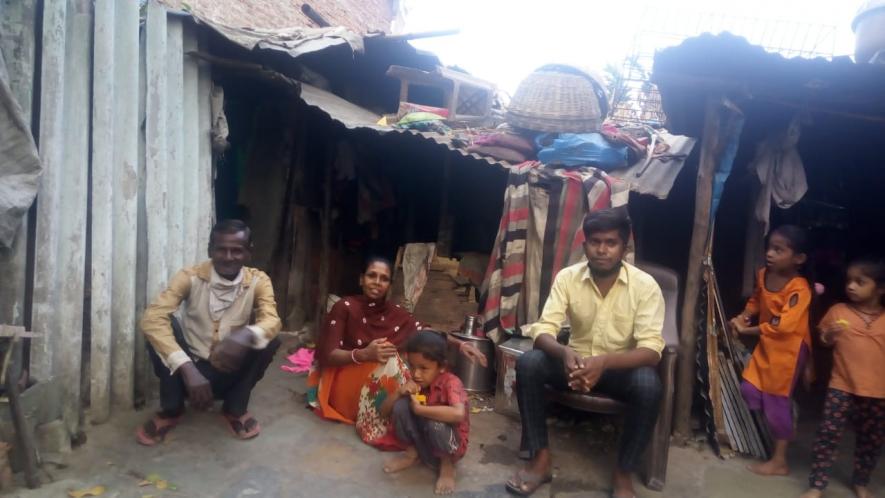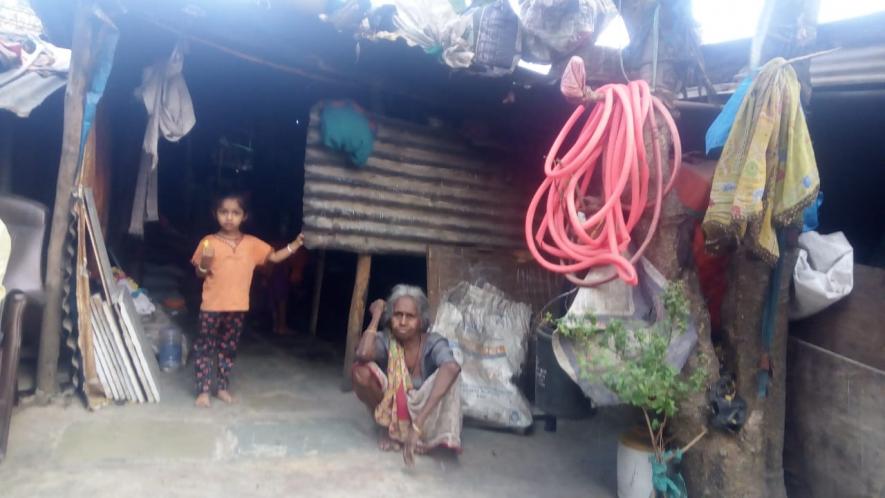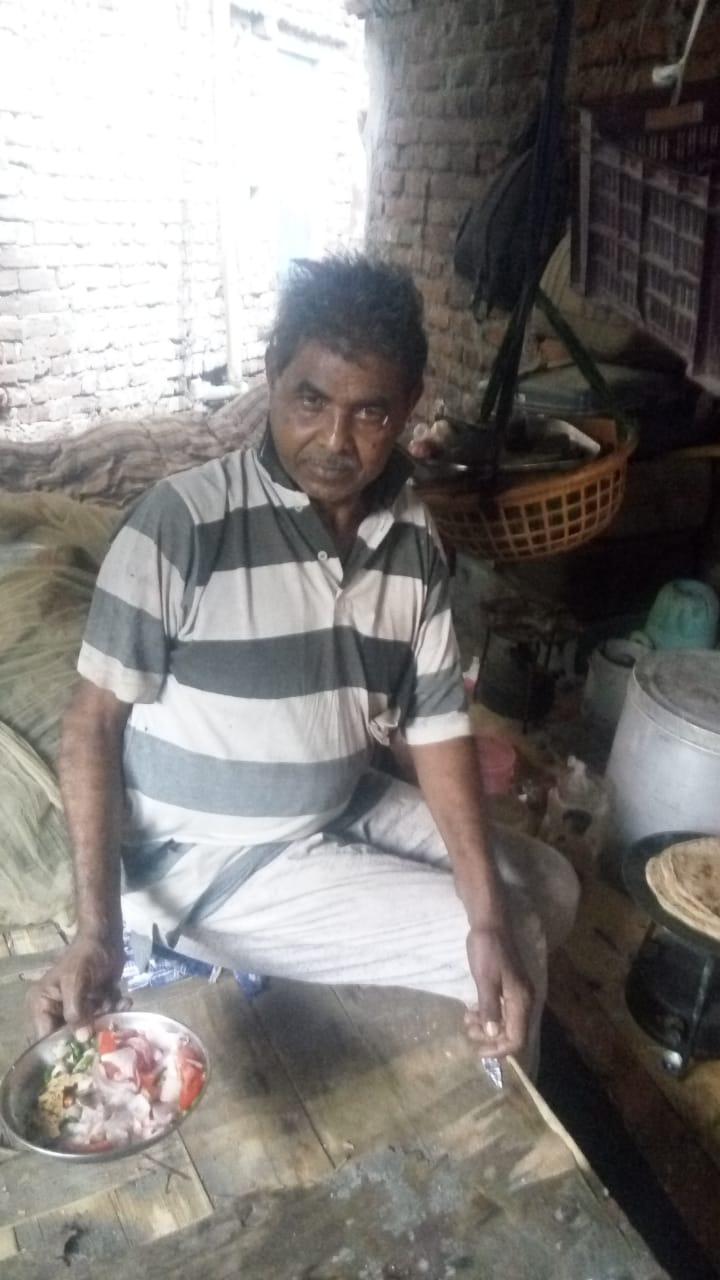Surat: ‘Workers Boiled Wheat and Ate with Salt... Have Now Run Out of Rations’

Textile workers in their homes in workers ghetto in Surat
Ahmedabad: On April 10, Thousands of migrant workers, mostly employed in the textile industry and residing in urban ghettos on the outskirts of Surat, came out on the streets, defying the lockdown to demand their due salaries and permission to return to their native states. More than thousand workers resorted to alleged arson and vandalised vegetables carts and other shops in vegetable market in Laskana area under Sarthana police station of Surat, Gujarat.
An FIR has been registered against the migrant workers for rioting and arson among other charges and over 70 people have been arrested.
According to reports, the workers, mostly from Uttar Pradesh, Bihar, Jharkhand, Odisha and Madhya Pradesh, had gathered on streets shouting slogans, demanding pending salaries, food and amenities and permission to be sent back home.
This is the second such incident in Gujarat, where migrant workers took to the streets to raise their demands. Earlier, on March 30, as many as 95 workers were arrested and police had to resort to lathi-charge and lob tear gas to disperse them.
“There are 31 messes running in the labour colonies and several NGOs are also providing food. Their only demand was that they be allowed to go back to their homes. We have, however, controlled the situation and police has been deployed in the areas,” RB Brahmbhatt, Police Commissioner of Surat, had told the media following the incident.

However, the workers said they had run out of money and food and feared they would die of hunger first and not COVID-19 infection.
“Within four hours of the announcement of lockdown and stoppage of trains, a majority of workers who could not get back home are stuck here without food, money, crammed in 10x10 sized rooms in the slums. Despite the Collector’s notice to employers to clear salary of workers, our due salary is not being cleared. After asking for several days, workers were paid part of their salaries from Rs 1,000 to Rs 4,000. We have even attempted to talk to the Collector regarding this but there has not been any respite so far,” Umashankar Mishra, a textile worker, told Newsclick.
Mishra, a resident of Uttar Pradesh, who works as a supervisor in the textile market and earns Rs 12,000 per month has been paid only Rs 5,000 since the lockdown.
“I can still manage even though I have stopped buying vegetables and been sustaining on dal and rice for days now. But workers who earn Rs 250 to Rs 400 per day have completely run out of money. Most workers bought whatever they could with their savings and came out on road only after they ran out of food. After the hue and cry, four days ago ration comprising of 3 kilogram of wheat, 1 kg of sugar, 1 kg of pulses, 1.5 kg of rice and 500 grams of salt were given to workers. About 25,000 workers who have Aadhaar cards were hopeful of getting some help. But only 1,783 workers of them could collect the rations. The next day, when more workers queued up, they were dispersed by the police. We were told that the stock is over and that ration was to be distributed for a day only,” added Mishra.
Faced with hunger and future uncertainty, the migrants, who have run out of money and are yet to receive pending salary, feel they are getting a raw deal from the authorities for no fault of theirs.
“Most workers have run out the ration they collected. All they could use was rice that they boiled and ate with salt. Giving them whole wheat was pointless, as there is no amenity to grind it into flour. However, when workers ran out of rice, they boiled the wheat and ate it with salt. Besides oil was not given so they could not cook any vegetable,” Mishra stated further.
According to the estimate of Federation of Surat Textile Traders Association (FOSTTA), when the lockdown was implemented, around 1-2 lakh workers, whose native places were around 400 to 500 kilometres away, managed to set for home by any means they could manage, including walking. However, around 6-8 lakh migrant workers are stuck in various ghettos in Surat who could not leave primarily because the trains had stopped plying.
Textile Units Face Huge Losses
“None of these workers have any documents by which they can get any government help in Surat. They are beneficiaries of BPL and ration cards but on addresses at their respective native states. The only help they are getting is from private organisations and NGOs. However, that is not enough to fulfil the basic needs of such huge number of people,” Champalal Both, President of FOSTTA, told Newsclick.
“We have asked the owners to pay and clear salaries as much as possible. But it is difficult for a small trader to do so with no earnings. The textile industry is suffering a loss of Rs 100 crore a day since the lockdown. We don’t know how many traders will recover this loss and will be able to resume their business. Most of the traders, who will suffer the worst amongst all in textile industry, had bought garments for the marriage season, Ramzan, regional new year and harvesting festivals. Now, even if the market opens, traders will not be able to sell that stock. Besides, we are also apprehending mass exodus of migrant workers as soon as the lockdown is lifted, which is going to affect the industry too,” added Bothra.
The Surat textile industry, including powerlooms, printing and dyeing mills, weaving, embroidery and stitching and textile market employs around 10 lakh migrant workers who live in ghettos in Pandesera, Sachin, Bestan, Dindoli, Kadodara, Kamrej, Katargam areas of Surat.

Most of the workers in these areas live without their families on sharing basis with other workers. In lieu of Rs 2,000-3000 a month, a group of workers get access to a bed, toilet and get to cook in a corner of a room, for 12 hours. As they leave for his shift, another set of workers replaces them in the room and pay rent for the next 12 hours. Since the lockdown, a room that is about 10x10 square feet in size and is usually shared between 4 to 5 workers is being shared by at least 10 to 12 workers. Besides, most houseowners have been asking for rent from these workers and some have been asked to vacate if they fail to pay.
“How do you expect workers to be live, crammed in a room with no food or other basic amenities. If the issue if not resolved, such an incident is bound to happen again,” said Mishra.
With the lockdown leaving lakhs of Surat’s textile workers leading a more crammed existence, defeating the very purpose of social distancing, without no money and barely anything to eat, the plight of workers seems nowhere on the radar of the authorities, so far.
Get the latest reports & analysis with people's perspective on Protests, movements & deep analytical videos, discussions of the current affairs in your Telegram app. Subscribe to NewsClick's Telegram channel & get Real-Time updates on stories, as they get published on our website.
























